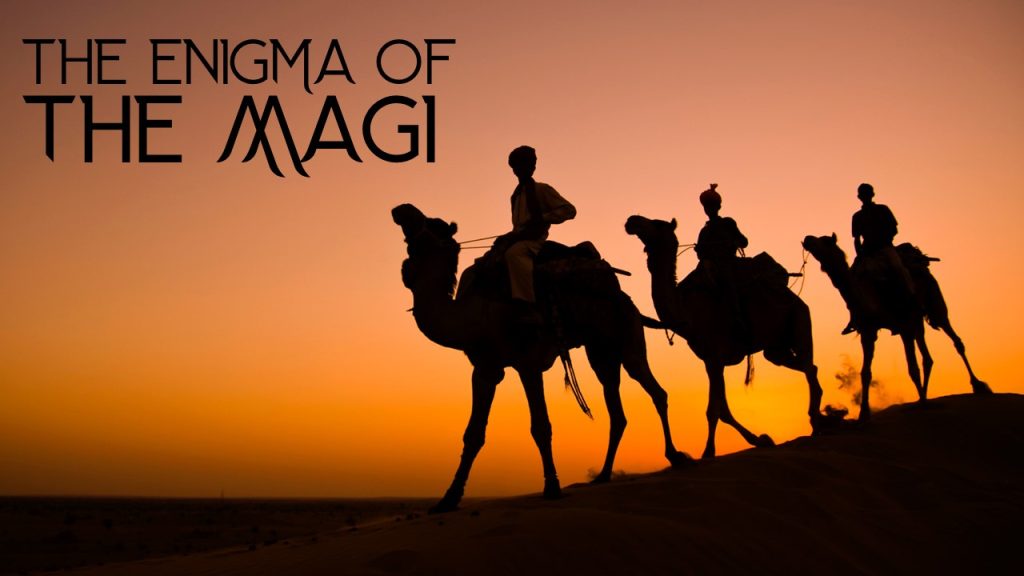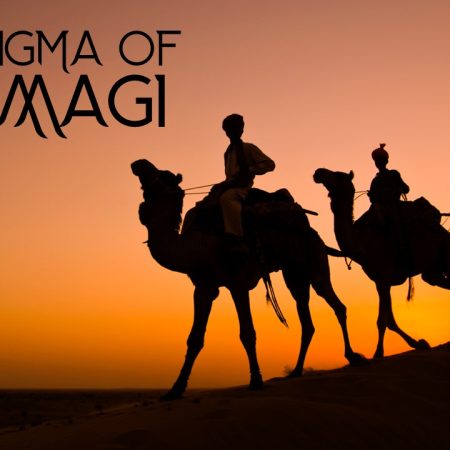
Behind the high altar of St Peter’s Cathedral in Cologne is what is reputed to be the largest reliquary, or container of religious relics, in the western world, and inside are the supposed remains of the Magi whose story is told in Matthew 2. The story goes that when the remains of the men were found their eyes were still in their sockets and they were looking towards Bethlehem. Believe that or not, but it’s an example of the legends and traditions that have built up around these three enigmatic characters.
From the biblical text we know almost nothing about them except that they were, according to the original Greek, magoi and they came from the east.
“Now after Jesus was born in Bethlehem of Judea, in the days of Herod the king, behold, wise men from the east came to Jerusalem, saying, “Where is he who has been born king of the Jews? For we saw his star when it rose and have come to worship him.”
Matthew 2:1-2
The Magi
We need to exercise some care here and not jump to simplistic conclusions, because while the Greek word magoi that Matthew uses is where we get the English word magic from, we shouldn’t be thinking of the modern usage that conjures up ideas of, well, conjurers. We know from ancient and reliable historical sources that the term originally described a priestly tribe of people from among the Medes who were based in the area of Babylon during the Babylonian and then the Medo-Persian Empire.
However, it seems to have become a more general term for the learned court advisers of Mesopotamia or Persia, who studied ancient and sacred texts, and watched the heavens to interpret the movements of stars and planets, believing they might contain messages from the gods. They combined elements of astronomy and astrology and could probably be identified with what we would recognise today as Zoroastrianism, which became the state religion in the Babylonian and then Persian Empires in the 6th century BC.
It is even possible, if not likely, that some of the Magi in Persia at the time of the birth of Christ would have had Jewish roots because of the large and lasting presence of Jews who had been taken into exile there by Nebuchadnezzar. At the very least, with their great interest in sacred texts, they would have been very heavily influenced by those Jews, including Daniel and his three friends in 605 BC, and others in the deportations of 597 and 586.
The Magi of Matthew 18 are not the first Magi we have references to in Scripture, nor the last. Elymas the magician (Greek – magus), who Paul encountered in Cyprus (Acts 13), appears to have been a professional court adviser who, probably through divination, gave counsel to senior officials like the proconsul.
In the Old Testament, Jeremiah 39:3 and 13 refers to a Nergal-sar-ezer as one of Nebuchadnezzar’s officials who came to Jerusalem in 586 BC. There is some dispute about the title given him in 39:13 – the Rab-mag – but it seems very possible it means something like ‘the Captain, or Chief, of the Magi’.
The “magicians” of Babylon, (Daniel 2:10), appear to have been Magi or wise men; a term “usually pertaining to a high social/religious class that would help interpret various omens” (Dictionary of Biblical Languages with Semantic Domains).
Following his correct interpretation of the king’s dream in Daniel 2, Daniel is made “chief prefect over all the wise men of Babylon”, effectively making him Chief of the Magi. Undoubtedly, he would have taught and shared with the Magi all the Old Testament prophecies of the coming of a great king, as revealed to him by God, but we must stress, of course, that Daniel was himself unwaveringly faithful to the true and living God.
The Magi were so powerful that historians tell us that no Persian was ever able to become king except under two conditions, namely that he mastered the scientific and religious disciplines of the Magi, and that he was approved of and crowned by them. So, that means that far from being kings, the Magi who visited Jesus were King-Makers! Indeed, that’s one reason Herod was “troubled” (Matthew 2:3). He knew full well that these visitors from the east had the power to make and break monarchies, and Herod was no more than a political puppet of Rome.
Now, of course, the infant King of kings did not need the accreditation of these Persian king makers, but Matthew uses their appearance, partly at least to contrast their worship of Christ with the murderous hatred of King Herod, and includes this story to show that Christ would be King over all nations, not just the Jews.
Matthew 2:11 recounts that the Magi “worshipped him”; the Greek word being – proskuneo, which means ‘kiss the feet of’ , or ‘stoop to kiss’, or ‘to kiss reverently’, and when the New Testament uses that word, it is always used of something or someone that is actually or supposedly divine. It is a word that is only fit for deity.
So, the clear implication here is that the Magi recognized that Jesus, the King, was actually God and they came to worship more than a king. They came to worship the anointed one that God had sent, the one fulfilling the Old Testament prophesies they had studied, none other than the Lord Jesus Christ, the Saviour of the world.
That’s utterly remarkable. Contrast that with what we are told about Herod in Matthew 2:4. He too knew that this was the Messiah, the anointed one. He made the connection in his mind. He knew that the king of the Jews and the Messiah of Israel were one and the same. His response? He plans to murder him.
Contrast the Magi with the Jewish religious leaders who didn’t seem to be particularly bothered or interested, despite knowing and understanding what was going on here.
Matthew’s interest in the visit of the Magi is to throw the spotlight on hugely important dignitaries coming from far away pagan lands to pay homage to the one they recognise to be “king of the Jews” (Matthew 2:2). This intrigues and enrages Herod in equal measure. The reality is that Herod and Jesus are rivals, and Herod will tolerate no rivals, not even one who is still an infant; while the Magi throw the spotlight on the one who deserves the allegiance of all kings and rulers – even Gentile ones.
